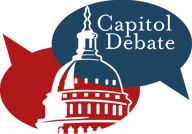Five Notable Debaters in U.S. Presidential History
Turns out debate is a very presidential activity
When it comes to winning the U.S. Presidency, numerous factors come into play, including campaign fundraising, the candidates’ past records, their views on economic and social issues, and the current state of the union, to name a few. Debates themselves may not change the minds of voters from pre- to post-debate, but history does lean on the side of skilled orators. Similarly, students who practice debate in middle and high school have higher standardized test scores and may go on to surpass their peers in future academic and professional achievements.
Abraham Lincoln
Perhaps the most notable in our nation’s history, the series of seven debates between Abraham Lincoln and Stephen Douglas wasn’t a debate for the presidency at all, but for the Illinois senatorial seat. Although Lincoln ultimately lost the seat, his performance throughout the debates elevated his profile on a national level and likely contributed to him later claiming the highest U.S. post – Commander in Chief. In addition, more than 150 years later, political debates as well as high school debate teams still follow the format set forth in the famous Lincoln-Douglas debates.

John F. Kennedy
According to Thomas White, author of The Making of the President 1960, John F. Kennedy was described as “calm and nerveless” against a sweating and “haggard-looking” Richard Nixon in the first televised presidential debate. The national broadcast shaped the future of presidential debates and pushed candidates to focus on “soft skills” outside of their political views alone. In addition to his charisma and oratorical skills, Kennedy’s good looks, grooming and charm won TV viewers over. Kennedy claimed victory, and he went on to win the election.
Lyndon B. Johnson
Lyndon B. Johnson’s experience in debating dates back to college, where he led his university’s debate team. After college, he taught public speaking and coached the debate team at Sam Houston High School in Texas, leading the team to a district championship victory. Johnson’s experience as both a debate team leader and coach served him well as he entered the political arena. His resume includes roles as a U.S. representative, senator, Senate Majority Leader, Senate Majority Whip and Vice President before succeeding to the U.S. Presidency following Kennedy’s assassination.
Gerald Ford
President Gerald Ford had been gaining in the polls against his opponent, former Gov. Jimmy Carter, prior to their 1976 televised debate. Proving once again that the Kennedy-Nixon debate had fundamentally changed political campaigns and TV media, Ford’s major gaffe in a nationally televised debate is considered to have cost him the election. Although polls showed the race was about even after their first debate, during the second debate, Ford’s erroneous statement that “There is no Soviet domination of Eastern Europe, and there never will be under a Ford administration” helped Carter jump ahead in the polls and win a close election.
Ronald Reagan
Known as The Great Communicator, many would argue that Ronald Reagan is one of the top orators in U.S. presidential history. In fact, a quick Google search turns up thousands of lists of the former President’s most memorable quotes, including this one from USA Today. In his 1980 debate against incumbent U.S. President Jimmy Carter, Reagan delivered a rebuttal against his opponent that began with the now famous words, “There you go again.” Finishing off the debate asking Americans, “Are you better off than you were four years ago?” Reagan not only won the debate in the eyes of most pundits; he won the presidency and went on to deliver even more quotable speeches through the last years of his life.
